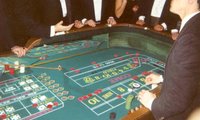The news that Tom Hudson's Pirate Capital, and his aptly-named "Jolly Rogering Fund" were taking some heat last week was no surprise (to me). Hudson's operation runs what is professed to be an "activist" fund. This effectively entails buying a wodge of an albeit "cheap" or otherwise unloved stock, ramping the price as much as one can once one has bought the line. Then publicly professing one's [affection, admiration, recognition of value] for the [company, business, sector] while simultaneously (and again publicly) expressing one's disaffection with [management, CEO, share price performance, business strategy]. For those with lots of their own money, secure credit lines, a keen eye for value, and a reasonably deep reservoir of patience, this can be rewarding as Nelson Peltz recently demonstrated with Heinz. But the equation is entirely different IF one is an agent, employs fickle forms of leverage, is subject to frequent SEC reporting, and is at the whims of market liquidity and redemption cycles that differ from one's possible duration. This caveat is NOT for the manager for he is popping the Veuve Cliquot and flying private so long as investor just show up in his fund.
He it must be said has the trader's option. For his capital "partner" on the other hand, it is an entirely different equation.
In the extreme, an activist's attention results in a quick sale of the company at a premium allowing one to exit the entire position, in cash, at a nice profit as was the case for Pirate & ski resort operator, Intrawest. However, this is the exception rather than the rule. More frequently, one buys a position, ramps it a bit, grabs a positive mark-to-market, leverages that to raise more assets and if he is smart and lucky, accrue and collect fees from an irreversible quarterly high-water mark. That is sweet, at least for a swashbuckling investment manager. What follows is: (a) he's "spent his ammo" or "shot his load" so to speak (b) passed the filing threshold (c) used his PR splash to exhort to the world his intentions (d) is now left with an unconscionably large and unmarketable position in a stock of dubious longer-term merits.
Often, the targets are flawed, which is why they are "cheap". They are in declining segments, facing stiff low-cost competition, or perhaps have not invested as they might have. Stale longs and short-sellers notice that the stock has gone up. It's elevated price now often deters value investors, as well as potential trade or private equity buyers. Basically, one has put lipstick on a pig, but it remains a pig by any other name. The financial privateer must now:(a) pray for a stock-specific or market tailwind to keep prices elevated, (b) collude with other pirates, (c) buy more of the same stock - prefarably at the end of the week, month and quarter to avoid losses and redemption cascade that will inevitably follow if he fails in "a", "b" &/or "c".
Now if our Corsair is fortunate, he will score a few extra-base hits, or home runs AND the market breeze will carry and reward one's accumulated positions. The virtuous circle of returns->new investors->new capital->buying more of the same->returns->new capital and so-on continues so the manager, now Master-of-The-Universe can speak authoritatively at conferences about the tremendous market opportunities there is, the virtually unlimited capacity of his vision (and his Fund), the unbounded opportunities that will open up in China as well as the social good he is doing for the world not to mention the untouchables in Calcutta. After all, Hedge Funds CARE, you know.
But as anyone who has been around can tell you, "shit happens". LTCM, 1987, Gulf Wars, fraud, panics, scares, regulatory changes, recessions, depressions, devaluations, hemorrhoids, your entire research staff walking out, you name it. Then like a frigate under attack, one is subject to the unvirtuous circle. Because something happened, one's positions come under pressure causing poor performance. Investors redeem causing one to necessarily sell positions, causing their prices to fall, causing one to lose more money, causing more redemptions. Somewhere in between all this, depending on the shit that has happened, the market, too, begins to gun for the positions of the once Master-of-the-Universe. The positions then return to the realm of "cheap getting cheaper" and once again might enter the sights of the private equity or deep value guys who invariably have more capital, more "principal" and less "agency", more patience, and less hubris.
Publicity-shy Warren Lichtenstein (and friends) were the group that seized the day in Japan. Though Yoshiaki Murakami's MAC may have made more headlines as a former MOF-man gone renegade, it was Steel that actually made the buckets of money - at least on a mark-to-market basis, and collected the fees in cold hard cash. There are three types of activist in Japan. First there is the "cooperative" ones that take a big line in a cheap company and truly desire to hold it for investment purposes. Silchester, Wilbur Ross's Taiyo Fund fall into this category. They let everyone one the object of their eye is "cheap", but they don't shake down management, though they do buy more at higher prices when "opportune". The second type is SFP or Symphony Financial Partners. They buy really shitty businesses and crappy companies at ostensibly knock-down prices. The companies may have some redeeming quality such as a crown jewel of undervaluied real estate, or sub-book valuation, or excess cash they
could return to shareholders if management were so inclined. There performance is entirely self-generated and this is effectively a market impact trade or ponzi for the really cynical. They cannot exit without destroying 50% of the market value, which is often the same amount of market appreciation they created when they bought their shares at higher and higher prices. If held, this trade is effectively a race to the death of when the company will burn, or mis-use, or write-down the value of their cash, investments or assets.
Steel Partners is the third type, that combines the first two. They adopted a portfolio approach and bought stakes in all the net-cash companies that were low hanging fruit. They bought more shares at higher and higher prices to generate mark-to-market profits that created the aforementioned "virtuous circle". Then they made public bids for a few companies to demonstrate that they were serious. Of course they had no intention of consummating the deal, and almost certainly had no interest in running a Japanese company. The bids accomplished a few things. They forced some change that might be construed as "good" from a passive shareholders point of view, but ultimately bad for an investor in Steel who was now an oversized holder of an unmarketable position in a once-cheap, but now pedestrianly valued security. Sure Steel has a large mark-to-market gain (which Steel collected incentive fees upon already). Sure the dividend is high, but with six-months trade of an average day's volume, one would have to take a massive haircut to liquidate. Moreover, at present valuations, many of the companies hold little appeal to private equity or trade buyers.
So what does the future hold for activism in Japan? Eventually, there will be more successful hostile deals, like the Hankyu-Hanshin merger. But they will be made by private equity firms or trade buyers who desire to actually strip out the cash and assets, run, merge and/or subsequently flip the company back out to the unsuspecting public market with negative book value. They will encounter resistence along the way from all the constituents, including the authorities who desire to keep the "wah" of the house in tact. But before then, perhaps during a capital dislocation event that is as yet to emerge, it is my forecast that Steel Partners and the other parasitic activist flippers who don;t really want to get their hands dirty, will be the victim of the most unbecoming unvirtuous circle, like the one we see unfolding today at Pirate's not-so-jolly Fund.
 Mizuho Securities reported in their latest 4th quarter strategy summary that Japanese public entities (The BoJ, the DIC, and the BPSC) held roughly YEN 7 trillion (nearly USD$65 billion) of listed stock.
Mizuho Securities reported in their latest 4th quarter strategy summary that Japanese public entities (The BoJ, the DIC, and the BPSC) held roughly YEN 7 trillion (nearly USD$65 billion) of listed stock.






